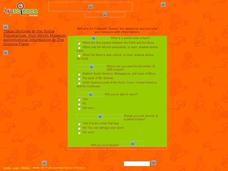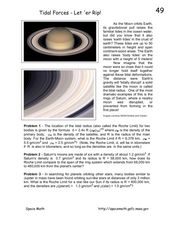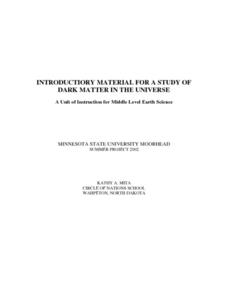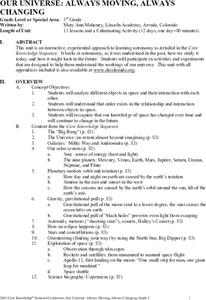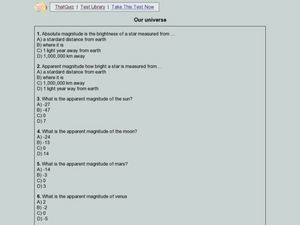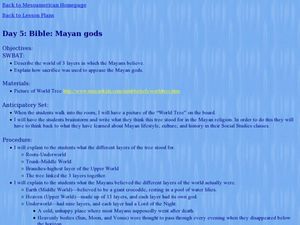Curated OER
Asteroids
Students examine the different types of asteroids and how they enter the atmosphere. In this space lesson students use mashed potatoes to create an asteroid they can eat.
Curated OER
Curious? Will You Be Eclipsed?
In this "Curious? Will you be eclipsed?" worksheet, 4th graders answer 4 questions interactively about eclipses, then check answers online.
Curated OER
The Earth, Sun Mood and Stars Unit (Planets too!)
Fifth graders prepare five activities to do then show their energy saving skills. In this investigative lesson students create five projects then participate in an energy saving demonstration.
Curated OER
Be A Planet
Students identify the name, order and attributes of the planets. They role play the position of planets, and draw pictures of the planets as well.
Curated OER
Why Do We Have Night?
Learners engage in a fun, creative way to discover how the Earth moves. This lesson helps students explain why there is day and night. It can also create curiosity to further study the solar system and eclipses!
Curated OER
Tidal Forces-Let'er Rip!
In this tidal forces worksheet, students read about the gravitational pull from the moon that causes the ocean tides. Students solve 3 problems including finding the Roche or the tidal radius for the Earth and Moon, comparing the Roche...
American Museum of Natural History
What is Astronomy?
Go study the universe. Pupils learn seven aspects about astronomy and astronomers. They begin to learn about constellations; distance and motion between objects; gravity; the electromagnetic spectrum; dark matter and energy; and teams of...
Curated OER
Dark Matter In The Universe
Students investigate the concept of dark matter and how it occurs in the universe. They conduct research using a variety of resources. Students use the information by reading at least two articles about dark matter. They also generate...
Curated OER
Email From Another Planet
For this article about emails and plants worksheet, students read short descriptions about 8 planets in the solar system and then imagine they are visiting one of the planets and send an email to a family member describing their...
Curated OER
Gravity and the Planets
For this gravity worksheet, students read about the solar system and the effects of the gravity of the sun, the planets and the moon on the orbits of the planets. They answer three critical thinking questions about gravity.
Curated OER
Sky Watchers: Ancient Astronomers
Students close their eyes and picture the sky. They are asked to brainstorm things they may see in the course of a night and day, such as the movement of the sun, moon, and stars. Students work in groups to coduct their research. They...
Curated OER
Planets in Proportion
Students apply estimation strategies and proportional reasoning to determine a scale comparing the planetary bodies to Earth. They convert measurements of time and distance using scientific notation. Both the metric and customary units...
Curated OER
Cosmic Wheels
Young scholars build a scale model of the Solar System and determine the time other planets take to travel around the Sun in comparison to the time of the Earth's revolution. The velocity of the planets are also determined in this lesson.
Curated OER
GPS Treasure Hunt for Knowledge
Students examine themselves as being part of a global community. In this global community lesson, students investigate GPS systems. Students gain knowledge on how the device works. Students discover that satellites provide information...
Curated OER
What's Up? Astronomy Curriculum
Students study astronomy. In preparation for a field trip to a planetarium, students discuss the stars, planets, and light. They explore the importance of the north star and constellations. The Digitarium system is used to assist the...
Curated OER
What's Up?
Students compare and contrast the various heavenly bodies found in the sky at night. They identify the moon and stars in the sky as well as how the stars form pictures called constellations. Students also experiment with reflection and...
Curated OER
Charting Seasonal Changes
Students research the Earth's patterns of rotation and revolution, create a chart and graph of these patterns and use them to explain the causes of night and day and summer and winter.
Curated OER
Our Universe: Always Moving, Always Changing
Students explore the main concepts of astronomy through the eleven lessons of this unit. The past, present, and future methods of studying the science are examined in this unit.
Curated OER
History of Astronomy
Students participate in assessments regarding the history of astronomy. They listen and take notes, draw a time line, draw a solar sytem designed by Ptolemy and create flashcards. They write an essay on Galileo, watch a video, take a...
Curated OER
Knowledge Quiz: The Universe
In this universe quiz worksheet, students complete a set of 10 multiple choice questions that cover a variety of concepts about the universe: constellations, black holes, the solar system, etc.
Curated OER
Our universe
For this quiz, students are asked 20 questions about the magnitude of planets and stars both in and out of our Solar System. An answer key is provided.
Curated OER
Using the Internet
In this using the internet learning exercise, students search several websites to review information about the heart, human senses, the solar system, and planets. Students also read information about the rock cycle and answer provided...
Curated OER
Bible: Mayan Gods
Students discover beliefs and practices of the Mayans. In this Mayan gods lesson, students discuss "The World Tree" of the Mayans, the three layers of the tree, and their meanings. Students discover the manner and purpose of the Mayan...
Curated OER
Ourselves
Students identify the main parts of the human body. They point to various parts of their own body, cut out pictures of humans and animals and sort them into the two categories, discuss the differences between animals and humans, and...



